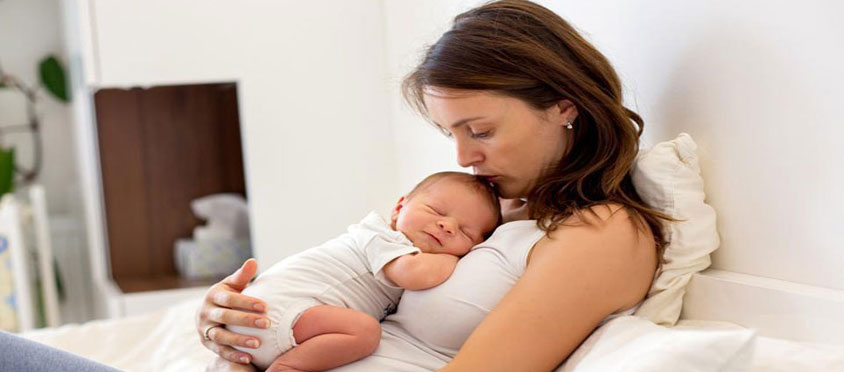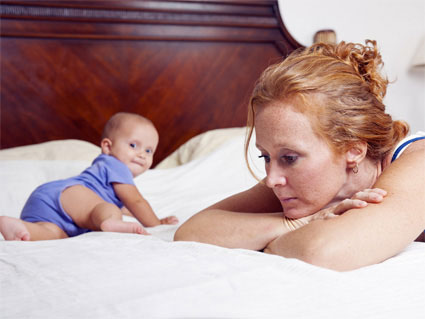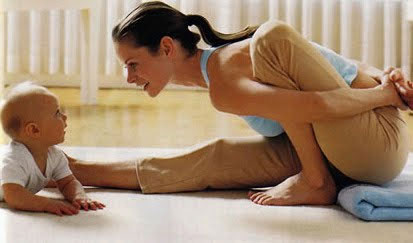In this articleYoure not aloneAnticlimaxBloodless coupTrying to copeAches and painsGuiltIm uglyYoure not alone Vineeta Singh recounts her postnatal experience: "I always thought that when I finally gave birth to my son, Id feel like Id climbed Everest - exhausted and thrilled. In fact, I felt weepy and irritable. I just wanted to be left alone. And I felt even worse because I couldnt figure out why I felt that way." Vineetas experience is not unique. Ramnik Mehta remembers that for the first few weeks after the baby was born shed find herself in tears for no apparent reason. She says, "When I held my daughter in my arms for the first time I expected that Id feel an instant bond. But I was just worried whether I was holding her the right way and feeling a little weird trying to feed her. I was sure that all this came naturally to all other women and I felt quite inadequate." The experience of becoming a new mother has been so romanticized by the media and society in general, that a fairly common phenomenon like postpartum depression comes as a rude shock. Statistics claim that as many as 90% of new mothers experience tearfulness, feelings of sadness, anxiety and inexplicable mood swings in the first few days after delivery. One possible explanation is the sudden drop in progesterone and estrogen levels after childbirth. However, there is a smaller percentage of women (about 20-25%) that experience serious depression that can begin any time within the first six weeks of delivery and go on for months. While the fluctuation in hormonal levels is partly to blame, there could be several other contributing factors. Anticlimax Every pregnant woman waits for the date of her delivery like a marathon runner looks for the finish line. She imagines herself lying in bed exhausted, but elated at successfully getting through the ordeal of labour, cradling her bundle of joy in her arms. However, many women find that they feel a sense of anticlimax because they have raised their expectations of the momentous occasion so high. Bloodless coup For nine months pregnant women become accustomed to being waited on hand and foot, their slightest whim and fancy being fulfilled. Suddenly, the spotlight shifts to the baby and nobody, including their husbands, seem to bother about them any more. This may seem like childish jealousy and most women would not like to admit it, but its only human to feel that way. Yesterdays princess has become a slave to her baby. Trying to cope Some women resent the fact that they cannot resume their hitherto well-ordered existence. Meena Krishnan complains, "Ever since Ive come home from the hospital, all I seem to be doing is looking after the baby. My house is a complete mess and I just dont have the energy to do anything about it." Looking after a baby is a full-time job that mothers are expected to do over and above the rest of the chores. If a new mother has no help, she cannot help but feel snowed under, especially since her energy levels are at an all-time low. Aches and pains New mothers feel a little like wounded soldiers come home after battle. They have cramps, constipation, engorged breasts, general soreness, may be even haemorroids. Given the fact that theyre not really in the best of shape physically, they can hardly be expected to be cheerful. Couple that with a lack of sleep and one can only sympathize with their mood swings. Guilt There is so much societal pressure on women to take to motherhood like ducks to water that they feel really guilty if they consider motherhood a drudgery; or if they dont overflow with maternal love every time they hold their babies in their arms; or if they dont think their babies to be the most beautiful in the world; or if they resent the fact that their time is not their own and they cant go out partying with their friends any more. While it is true that once youve decided to be a mother, you have agreed to a sea change in your lifestyle, it doesnt mean that its abnormal to long for the pre-baby carefree days. Im ugly Somehow when a woman is pregnant and walks around looking like shes swallowed a watermelon, she doesnt feel ugly herself and the rest of the world finds her radiant and adorable. However, once the babys out, a woman feels nothing but fat. Read more on Coping with Depression
You're not alone
Vineeta Singh recounts her postnatal experience: "I always thought that when I finally gave birth to my son, I'd feel like I'd climbed Everest - exhausted and thrilled. In fact, I felt weepy and irritable. I just wanted to be left alone. And I felt even worse because I couldn't figure out why I felt that way."
Vineeta's experience is not unique. Ramnik Mehta remembers that for the first few weeks after the baby was born she'd find herself in tears for no apparent reason. She says, "When I held my daughter in my arms for the first time I expected that I'd feel an instant bond. But I was just worried whether I was holding her the right way and feeling a little weird trying to feed her. I was sure that all this came naturally to all other women and I felt quite inadequate."
The experience of becoming a new mother has been so romanticized by the media and society in general, that a fairly common phenomenon like postpartum depression comes as a rude shock. Statistics claim that as many as 90% of new mothers experience tearfulness, feelings of sadness, anxiety and inexplicable mood swings in the first few days after delivery. One possible explanation is the sudden drop in progesterone and estrogen levels after childbirth. However, there is a smaller percentage of women (about 20-25%) that experience serious depression that can begin any time within the first six weeks of delivery and go on for months. While the fluctuation in hormonal levels is partly to blame, there could be several other contributing factors.
Anticlimax
Every pregnant woman waits for the date of her delivery like a marathon runner looks for the finish line. She imagines herself lying in bed exhausted, but elated at successfully getting through the ordeal of labour, cradling her bundle of joy in her arms. However, many women find that they feel a sense of anticlimax because they have raised their expectations of the 'momentous' occasion so high.
Bloodless coup
For nine months pregnant women become accustomed to being waited on hand and foot, their slightest whim and fancy being fulfilled. Suddenly, the spotlight shifts to the baby and nobody, including their husbands, seem to bother about them any more. This may seem like childish jealousy and most women would not like to admit it, but it's only human to feel that way. Yesterday's princess has become a slave to her baby.
Trying to cope
Some women resent the fact that they cannot resume their hitherto well-ordered existence. Meena Krishnan complains, "Ever since I've come home from the hospital, all I seem to be doing is looking after the baby. My house is a complete mess and I just don't have the energy to do anything about it." Looking after a baby is a full-time job that mothers are expected to do over and above the rest of the chores. If a new mother has no help, she cannot help but feel snowed under, especially since her energy levels are at an all-time low.
Aches and pains
New mothers feel a little like wounded soldiers come home after battle. They have cramps, constipation, engorged breasts, general soreness, may be even haemorroids. Given the fact that they're not really in the best of shape physically, they can hardly be expected to be cheerful. Couple that with a lack of sleep and one can only sympathize with their mood swings.
Guilt
There is so much societal pressure on women to take to motherhood like ducks to water that they feel really guilty if they consider motherhood a drudgery; or if they don't overflow with maternal love every time they hold their babies in their arms; or if they don't think their babies to be the most beautiful in the world; or if they resent the fact that their time is not their own and they can't go out partying with their friends any more. While it is true that once you've decided to be a mother, you have agreed to a sea change in your lifestyle, it doesn't mean that it's abnormal to long for the pre-baby carefree days.
I'm ugly
Somehow when a woman is pregnant and walks around looking like she's swallowed a watermelon, she doesn't feel ugly herself and the rest of the world finds her radiant and adorable. However, once the baby's out, a woman feels nothing but fat.
Read more on Coping with Depression 






























